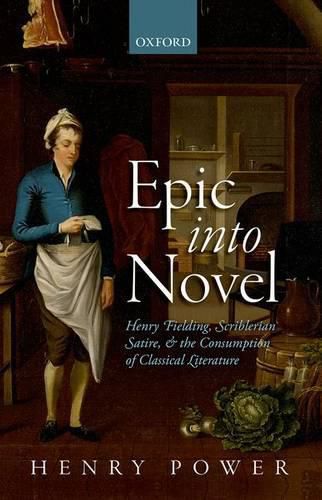Readings Newsletter
Become a Readings Member to make your shopping experience even easier.
Sign in or sign up for free!
You’re not far away from qualifying for FREE standard shipping within Australia
You’ve qualified for FREE standard shipping within Australia
The cart is loading…






Epic into Novel looks at Henry Fielding’s adaptation of classical epic in the context of what he called the ‘Trade of … authoring’. Fielding was always keen to stress that his novels were modelled on classical literature. Equally, he was fascinated by–and wrote at length about–the fact that they were objects to be consumed. He recognised that he wrote in an age when an author had to consider himself ‘as one who keeps a public Ordinary, at which all persons are welcome for their Money.’ In describing his work, he alludes both to Homeric epic and to contemporary cookery books.
This tension in Fielding’s work has gone unexplored, a tension between his commitment to a classical tradition and his immersion in a print culture in which books were consumable commodities. This interest in the place of the ancients in a world of consumerism was inherited from the previous generation of satirists. The ‘Scriblerians’–among them Jonathan Swift, John Gay, and Alexander Pope–repeatedly suggest in their work that classical values are at odds with modern tastes and appetites. Fielding, who had idolised these writers as a young man, developed many of their satiric routines in his own writing. But Fielding broke from Swift, Gay, and Pope in creating a version of epic designed to appeal to modern consumers.
Henry Power provides new readings of works by Swift, Gay, and Pope, and of Fielding’s major novels. He examines Fielding’s engagement with various Scriblerian themes–primarily the consumption of literature, but also the professionalisation of scholarship, and the status of the author–and shows ultimately that Fielding broke with the Scriblerians in acknowledging and celebrating the influence of the marketplace on his work.
$9.00 standard shipping within Australia
FREE standard shipping within Australia for orders over $100.00
Express & International shipping calculated at checkout
Epic into Novel looks at Henry Fielding’s adaptation of classical epic in the context of what he called the ‘Trade of … authoring’. Fielding was always keen to stress that his novels were modelled on classical literature. Equally, he was fascinated by–and wrote at length about–the fact that they were objects to be consumed. He recognised that he wrote in an age when an author had to consider himself ‘as one who keeps a public Ordinary, at which all persons are welcome for their Money.’ In describing his work, he alludes both to Homeric epic and to contemporary cookery books.
This tension in Fielding’s work has gone unexplored, a tension between his commitment to a classical tradition and his immersion in a print culture in which books were consumable commodities. This interest in the place of the ancients in a world of consumerism was inherited from the previous generation of satirists. The ‘Scriblerians’–among them Jonathan Swift, John Gay, and Alexander Pope–repeatedly suggest in their work that classical values are at odds with modern tastes and appetites. Fielding, who had idolised these writers as a young man, developed many of their satiric routines in his own writing. But Fielding broke from Swift, Gay, and Pope in creating a version of epic designed to appeal to modern consumers.
Henry Power provides new readings of works by Swift, Gay, and Pope, and of Fielding’s major novels. He examines Fielding’s engagement with various Scriblerian themes–primarily the consumption of literature, but also the professionalisation of scholarship, and the status of the author–and shows ultimately that Fielding broke with the Scriblerians in acknowledging and celebrating the influence of the marketplace on his work.